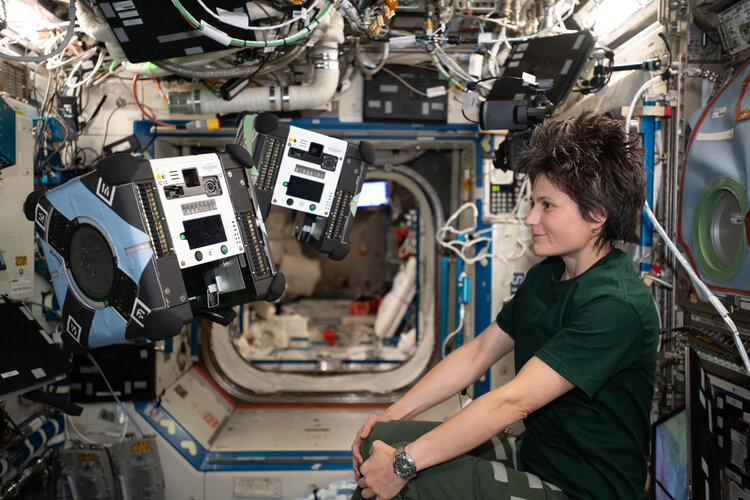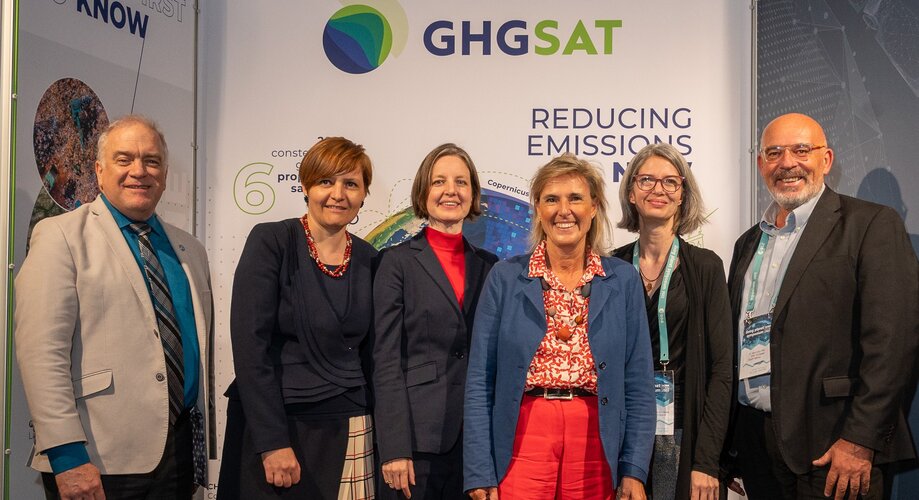
Copernical Team
CubeSat set to demonstrate NASA's fastest laser link from space
 NASA's Pathfinder Technology Demonstrator 3 (PTD-3) mission, carrying the TeraByte InfraRed Delivery (TBIRD) system, will debut on May 25 as part of SpaceX's Transporter-5 rideshare launch. TBIRD will showcase the high-data-rate capabilities of laser communications from a CubeSat in low-Earth orbit. At 200 gigabits per second (Gbps), TBIRD will downlink data at the highest optical rate ever achi
NASA's Pathfinder Technology Demonstrator 3 (PTD-3) mission, carrying the TeraByte InfraRed Delivery (TBIRD) system, will debut on May 25 as part of SpaceX's Transporter-5 rideshare launch. TBIRD will showcase the high-data-rate capabilities of laser communications from a CubeSat in low-Earth orbit. At 200 gigabits per second (Gbps), TBIRD will downlink data at the highest optical rate ever achi OneWeb and TinSky complete first West African LEO Satellite Gateway
 TinSky Connect has successfully completed the installation of 15 OneWeb antennas and customer provided equipment at a Satellite Network Portal (SNP) or gateway facility in Accra, Ghana.
OneWeb is a global communications network powered through space, enabling connectivity for governments, businesses, and communities. Tinsky Connect was selected as OneWeb's technical engineering partner for
TinSky Connect has successfully completed the installation of 15 OneWeb antennas and customer provided equipment at a Satellite Network Portal (SNP) or gateway facility in Accra, Ghana.
OneWeb is a global communications network powered through space, enabling connectivity for governments, businesses, and communities. Tinsky Connect was selected as OneWeb's technical engineering partner for Soil, sutures, and climate modeling among investigations riding SpaceX CRS-25 Dragon to ISS
 The 25th SpaceX cargo resupply services mission (SpaceX CRS-25) carrying scientific research and technology demonstrations to the International Space Station is scheduled for launch June 7 from NASA's Kennedy Space Center in Florida. Experiments aboard the Dragon capsule include studies of the immune system, wound healing, soil communities, and cell-free biomarkers, along with mapping the compos
The 25th SpaceX cargo resupply services mission (SpaceX CRS-25) carrying scientific research and technology demonstrations to the International Space Station is scheduled for launch June 7 from NASA's Kennedy Space Center in Florida. Experiments aboard the Dragon capsule include studies of the immune system, wound healing, soil communities, and cell-free biomarkers, along with mapping the compos NASA-supported solar sail could take science to new heights
 As NASA's exploration continues to push boundaries, a new solar sail concept selected by the agency for development toward a demonstration mission could carry science to new destinations.
The Diffractive Solar Sailing project was selected for Phase III study under the NASA Innovative Advanced Concepts (NIAC) program. Phase III aims to strategically transition NIAC concepts with the highest
As NASA's exploration continues to push boundaries, a new solar sail concept selected by the agency for development toward a demonstration mission could carry science to new destinations.
The Diffractive Solar Sailing project was selected for Phase III study under the NASA Innovative Advanced Concepts (NIAC) program. Phase III aims to strategically transition NIAC concepts with the highest InSight's Final Selfie
 NASA's InSight Mars lander took this final selfie on April 24, 2022, the 1,211th Martian day, or sol, of the mission. The lander is covered with far more dust than it was in its first selfie, taken in December 2018, not long after landing - or in its second selfie, composed of images taken in March and April 2019.
The arm needs to move several times in order to capture a full selfie. Becau
NASA's InSight Mars lander took this final selfie on April 24, 2022, the 1,211th Martian day, or sol, of the mission. The lander is covered with far more dust than it was in its first selfie, taken in December 2018, not long after landing - or in its second selfie, composed of images taken in March and April 2019.
The arm needs to move several times in order to capture a full selfie. Becau Boeing's Starliner faces one more challenge as it returns to Earth
 Boeing's Starliner capsule is readying to return to Earth on Wednesday in the final step of a key test flight to prove itself worthy of providing rides for NASA astronauts to the International Space Station.
The spaceship is scheduled to autonomously undock at 2:36 pm Eastern Time (1836 GMT) and touch down in New Mexico just over four hours later, at 2249 GMT, wrapping up a six-day mission c
Boeing's Starliner capsule is readying to return to Earth on Wednesday in the final step of a key test flight to prove itself worthy of providing rides for NASA astronauts to the International Space Station.
The spaceship is scheduled to autonomously undock at 2:36 pm Eastern Time (1836 GMT) and touch down in New Mexico just over four hours later, at 2249 GMT, wrapping up a six-day mission c Supporting the Paris Agreement from space

Earth observation is already capable of supporting national climate action, but there are many more opportunities on the horizon, according to discussions today among leading scientists and policymakers at ESA’s Living Planet Symposium being held in Bonn, Germany.
Watch live: Samantha Cristoforetti in-flight call to World Economic Forum (WEF) 2022 in Davos

NASA Awards Contract to National Academy of Sciences
 NASA has awarded a sole-source contract to the National Academy of Sciences of Washington to conduct studies on questions of national importance within the domain of NASA science and technology programs relating to space science, Earth science, and biological and physical science in space.
NASA has awarded a sole-source contract to the National Academy of Sciences of Washington to conduct studies on questions of national importance within the domain of NASA science and technology programs relating to space science, Earth science, and biological and physical science in space. GHGSat joins ESA’s Third Party Mission Programme

GHGSat, a leader in high-resolution greenhouse gas monitoring from space, has officially joined ESA’s prestigious Third Party Mission Programme. Announced today at the Living Planet Symposium currently taking place in Bonn, data from the company’s fleet of commercial satellites will be provided, free of charge, to researchers working in the fields of Earth science and climate change. Users will be able to access greenhouse gas measurements from sites all around the world.

